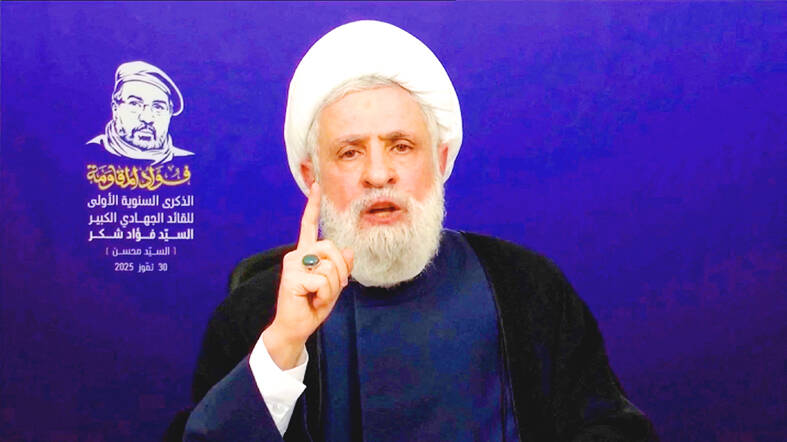Hezbollah on Wednesday said that it would treat a Lebanese government decision to disarm the militant group “as if it did not exist,” accusing the Cabinet of committing a “grave sin.”
Lebanese Prime Minister Nawaf Salam on Tuesday said that the government had tasked the army with developing a plan to restrict weapons to government forces by the end of this year.
The plan is to be presented to the government by the end of this month for discussion and approval, and another Cabinet meeting scheduled for yesterday was to continue the talks, including on a US-proposed timetable for disarmament.

Photo: Reuters
Hezbollah said that the government had “committed a grave sin by taking the decision to disarm Lebanon of its weapons to resist the Israeli enemy.”
The decision is unprecedented, as Lebanon’s civil war factions gave up their weapons three-and-a-half decades ago.
“This decision undermines Lebanon’s sovereignty and gives Israel a free hand to tamper with its security, geography, politics and future existence... Therefore, we will treat this decision as if it does not exist,” the group said in a statement.
The government said its decision came as part of implementing a ceasefire implemented in November last year that sought to end more than a year of hostilities between Israel and Hezbollah, which culminated in two months of full-blown war.
Hezbollah said it viewed the government’s move as “the result of dictates from US envoy” Tom Barrack.
It “fully serves Israel’s interests and leaves Lebanon exposed to the Israeli enemy without any deterrence,” the group said.
Hezbollah was the only faction that kept its weapons after Lebanon’s civil war from 1975 to 1990.
It emerged weakened politically and militarily from its latest conflict with Israel, its arsenal pummeled and its senior leadership crippled.
Israel has kept up its strikes on Hezbollah and other targets despite the truce and has threatened to keep doing so until the group has been disarmed.
An Israeli strike on the town of Tulin on Wednesday killed one person and wounded another, the Lebanese Ministry of Health said.
Israel also launched a series of airstrikes on southern Lebanon, wounding at least two people, the ministry said.
The Israeli military said that it struck “weapons storage facilities, a missile launcher and Hezbollah terrorist infrastructure which stored engineering tools that allowed for the re-establishment of terrorist infrastructure in the area.”
Hezbollah said that Israel must halt the attacks before any domestic debate about its weapons and a new defense strategy could begin.

Eleven people, including a former minister, were arrested in Serbia on Friday over a train station disaster in which 16 people died. The concrete canopy of the newly renovated station in the northern city of Novi Sad collapsed on Nov. 1, 2024 in a disaster widely blamed on corruption and poor oversight. It sparked a wave of student-led protests and led to the resignation of then-Serbian prime minister Milos Vucevic and the fall of his government. The public prosecutor’s office in Novi Sad opened an investigation into the accident and deaths. In February, the public prosecutor’s office for organized crime opened another probe into

RISING RACISM: A Japanese group called on China to assure safety in the country, while the Chinese embassy in Tokyo urged action against a ‘surge in xenophobia’ A Japanese woman living in China was attacked and injured by a man in a subway station in Suzhou, China, Japanese media said, hours after two Chinese men were seriously injured in violence in Tokyo. The attacks on Thursday raised concern about xenophobic sentiment in China and Japan that have been blamed for assaults in both countries. It was the third attack involving Japanese living in China since last year. In the two previous cases in China, Chinese authorities have insisted they were isolated incidents. Japanese broadcaster NHK did not identify the woman injured in Suzhou by name, but, citing the Japanese

YELLOW SHIRTS: Many protesters were associated with pro-royalist groups that had previously supported the ouster of Paetongtarn’s father, Thaksin, in 2006 Protesters rallied on Saturday in the Thai capital to demand the resignation of court-suspended Thai Prime Minister Paetongtarn Shinawatra and in support of the armed forces following a violent border dispute with Cambodia that killed more than three dozen people and displaced more than 260,000. Gathered at Bangkok’s Victory Monument despite soaring temperatures, many sang patriotic songs and listened to speeches denouncing Paetongtarn and her father, former Thai prime minister Thaksin Shinawatra, and voiced their backing of the country’s army, which has always retained substantial power in the Southeast Asian country. Police said there were about 2,000 protesters by mid-afternoon, although

MOGAMI-CLASS FRIGATES: The deal is a ‘big step toward elevating national security cooperation with Australia, which is our special strategic partner,’ a Japanese official said Australia is to upgrade its navy with 11 Mogami-class frigates built by Japan’s Mitsubishi Heavy Industries, Australian Minister for Defence Richard Marles said yesterday. Billed as Japan’s biggest defense export deal since World War II, Australia is to pay US$6 billion over the next 10 years to acquire the fleet of stealth frigates. Australia is in the midst of a major military restructure, bolstering its navy with long-range firepower in an effort to deter China. It is striving to expand its fleet of major warships from 11 to 26 over the next decade. “This is clearly the biggest defense-industry agreement that has ever